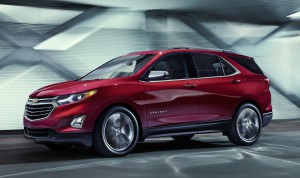With the industry in the midst of the critical spring selling season, U.S. auto sales slowed more than expected during March. Ford, Fiat Chrysler Automobiles and Toyota all reported drops in demand, but General Motors, Nissan and Volkswagen-Audi posted modest increases for the month. Other makers see similar problems looming on the horizon. And with sales expected to continue slowing in the months ahead, that poses some potentially significant problems for the Trump Administration.
GM’s March numbers highlight the challenges the industry – and, potentially, the White House – is facing. While the maker’s sales were up for March, that was offset by a sharp rise in its inventory of unsold vehicle, which climbed to 98 days by the end of the month, about 50% above what is considered the industry norm.
The largest domestics automaker is highly likely to increase use of incentives to move that inventory, according to industry analysts. However, it’s not a single prong approach: GM is also ordering temporary shutdowns at several plants. And others makers may be forced to take similar steps. This flies in the face of Trump’s ongoing push to expand auto production in the U.S., and potentially undercuts his credibility as a job producer.
If these actions can’t turn around what is already predicted by some analysts to be a slower year than 2016, any move by the industry to shift manufacturing operations from Mexico and other overseas locations to the U.S. would be derailed. And, while the auto industry was a major force in helping the American economy rebound from the Great Recession at the beginning of the decade, a sales slowdown could weaken the overall economy going forward, further challenging the new White House team.
Despite the tough start to the year, GM executives remained upbeat. “The economy is strong and we see more growth ahead for our brands,” said Kurt McNeil, U.S. vice president of sales operations. “More people are working, consumer confidence is at a 16-year high, fuel prices are low and Chevrolet, Buick, GMC and Cadillac have a wave of new crossovers to compete in the industry’s biggest and hottest segments.”
(Analysts predicted March sales would rise 2% over 2016 results. Click Here to see why.)
Ford executives also remained positive even though the company’s U.S. sales dropped during 7% versus a year ago. Retail sales declined 2% last month, while fleet sales of 78,510 vehicles were down 17%. reflecting a strong year ago comparison, with customer orders front loaded in early 2016, Ford representatives said.
“Our high series Super Duty trucks and all new F-150 Raptor drove double-digit F Series sales gains in March, along with the strongest year-over-year increase in transaction prices of any truck manufacturer in the industry,” noted Mark LaNeve, Ford vice president U.S. marketing, sales and service. The average transaction of Ford vehicles increased $1,800 last month, compared to an industry increase of $190, he added.
FCA also blamed its 5% drop in sales on the pull back from fleet sales compared with sales in March 2016. In March, fleet sales dropped 15% year-over-year as FCA US continues reducing its sales to the daily rental segment. Fleet sales represented 23% of total FCA US sales in March. FCA US retail sales of 146,262 units were down 1% for the month and represented 77% of total March sales.
Toyota Motor North America said its March sales dropped 2.1% from March 2016 on a volume basis.
(Click Here for details about car buyers getting longer loans.)

Sluggish auto sales could cause President Donald Trump some problems. If makers can turn around declines, the likelihood of moving production back to the U.S. becomes more unlikely.
“The industry might see its first dip below a 17 million SAAR since June 2016, although it will likely be nearly flat to last March,” said Jack Hollis, group vice president and general manager, Toyota division. “The Toyota division set a new light truck record for the month and quarter as we saw SUV sales sizzle with a best ever March for RAV4, Highlander, and 4Runner, all up double digits.”
March 2017 marked the 75th consecutive month of record sales for Audi of America. The previous March record was set last year with 18,392 vehicles sold. Through the first quarter of 2017, Audi sales have risen 9% to 45,647 vehicles.
Volkswagen of America Inc. reported a 2.7% increase over March 2016. With 76,290 units delivered year-to-date in 2017, the company is reporting an increase of 10.1% in year-over-year sales.
Nissan Group today announced U.S. sales in March 2017 set an all-time record at 168,832 units, an increase of 3% over the prior year. Overall sales of Nissan crossovers, trucks and SUVs set an all-time record, up 26%.
Kelley Blue Book reported the estimated average transaction price for light vehicles in the United States was $34,342 in March 2017. New-car sales prices have increased by $587 from March 2016, while falling $133 or 0.4% from last month.
“New-car prices are up yet again by just under 2%, which is a slightly lower increase than in the first two months of the year,” said Tim Fleming, analyst for Kelley Blue Book.
Fleming noted signs of weakness in some hot vehicle segments, such as full-size trucks and subcompact SUVs. Truck sales were down 2% while SUV transaction prices dropped 3%.
(Ally raises caution flag about 2017 auto sales. To see why, Click Here.)
“Rising incentives and discounts on cars have become common, but now they are growing more in truck and SUV segments, due to slowing consumer demand for new vehicles and high levels of inventory available,” he said.


